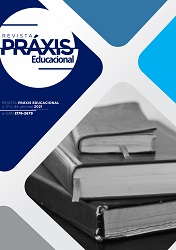LIFE STORIES AND TRAINING OF CAREGIVERS OF THE ELDERLY
DOI:
https://doi.org/10.22481/praxisedu.v17i44.8025Keywords:
Life Stories, Training, Elderly’ CaregiversAbstract
This article aims to reflect on the life stories of elderly’s caregivers, as a method of investigation in itself and as a (self)training modality in a professional context. In a process of building life stories we share the memory of individual parts of life, which become formatively meaningful for narrators as well as for the researcher who can thus question new modalities of epistemological realization. The article is based on an investigative process with caregivers of elderly people. Listening to their voices constitutes, from the outset, the recognition of the value of their lives, which highlights the political relevance of life stories in the personal field, as well as of research, as a manifestation of
the understanding of each subject as a participant in the process of building social knowledge. The oral production, carried out during the interview of the social actors who are narrated, allows the subject to surrender his or her own story, exalting what is his or her identity and transmitting it, little by little, to the researcher. The life of each is a creative expression that, when made known to the ears and analysis of the researcher, tends to create controversial interpretations and questionings, enhancing new formative and epistemological possibilities. The life of each is a creater expression that, when made known to the ears and analysis of the researcher, tends to create controversial interpretations and questionings, enhancing new formative and epistemological possibilities. The results of the study showed that life stories served three important dimensions: 1) the self-awareness and (self-)trainig of the participants, 2) our access, as trainer-researchers, to their knowledge and 3) the epistemic value of life stories in the field of knowledge about professionals of human.
Downloads
References
ANSART, Pierre. Percursos de memórias em terras de história: problemáticas atuais. In: BRESCIANI, Stella & NAXARA, Márcia (orgs.). Memória e (res)sentimento: Indagações sobre uma questão sensível. Campinas, SP: Editora da Unicamp, 2001. p.15-36.
APPEL, Michael. La entrevista (auto)biográfica narrativa: Fundamentos teóricos y la praxis del análisis mostrada a partir del estudio de caso sobre el cambio cultural de los Otomíes en México. Forum: Qualitative Social Research, vol. 6, n. 2, artigo 16. 2005. 35p. ISSN 1438-5627. PDF.
ARAÚJO, Mónica. Os Contributos das Histórias de Vida de Colaboradoras na Prática Profissional com Idosos. 187f. Dissertação (Mestrado em Educação – Formação, Trabalho e Recursos Humanos). Universidade do Minho, Gualtar, Braga, 2019.
BRANDÃO, Ana Maria. Entre a vida vivida e a vida contada: A história de vida como material primário de investigação sociológica. Universidade do Minho, Braga, 2007.
DELORY-MOMBERGER, Christine. Formação e socialização: os ateliês biográficos de projeto. Educação e Pesquisa, n.3. São Paulo, 2006. 12p. ISSN 1517-9702.
FREIRE, Paulo. Pedagogia do Oprimido. Rio de Janeiro: Paz e Terra, 1970. 107p.
GUTERRES, António. Relatório com análises e recomendações para enfrentar desafios. ONU. https://news.un.org/pt/story/2020/05/1712232. Acessado em 30 de setembro de 2020.
JOSSO, Marie-Christine. Experiências de Vida e Formação. 2. ed. São Paulo: Editora da UFRN, 2010.
LECHNER, Elsa (org). Histórias de vida: olhares interdisciplinares. Porto: Edições Afrontamento, 2009.
MORAES, Roque. Análise de conteúdo. Revista Educação, n.37. Porto Alegre, 1999. 35p. PDF.
PINEAU, Gaston. As Histórias de Vida em Formação: Génese de uma corrente de pesquisa-ação-formação existencial. Vol. 32, n.2. São Paulo, 2006. 14p
POLLACK, Michael. Memória e identidade social. Estudos Históricos. Vol. 5, n. 10. Rio de Janeiro, 1992. 12p.
PRADO, Guilherme do Val Toledo & SOLIGO, Rosaura. (org.). Memorial de Formação – quando as memórias narram a história da formação. In: PRADO, G. & SOLIGO, R. (Org.). Porque escrever é fazer história: revelações, subversões, superações. Campinas: Alínea, 2005. p. 42-60.
RIBEIRO, Maria & Santos Rosângela (2000). O método “história de vida” e seu uso em pesquisa de enfermagem com gestante HIV positivo. Escola Anna Nery Revista de Enfermagem nº 1. Págs. 46-54.
RICOEUR, Paul. A Metáfora Viva. Porto: Rés-Editora, 1983
SARMENTO, Teresa. Histórias de vida de educadoras de infância. Lisboa: Instituto de Inovação Educacional, 2002.
SEIXAS, Jacy Alves de. Percursos de memórias em terras de história: problemáticas atuais. In: BRESCIANI, Stella & NAXARA, Márcia (orgs.). Memória e (res)sentimento: Indagações sobre uma questão sensível. Campinas, SP, Editora da Unicamp: 2001. p. 37-58
TONON, Luciane. Narrativas biográficas: da busca à construção de um método. In: RUBIO, Katia (org.), A narrativa como linguagem na construção da memória. São Paulo, Képos: 2006. P. 121-135
KÖTTIG, Michaela & Völter, Bettin. “Isso, sim, é ser sociólogo!” - Uma entrevista narrativa com Fritz Schütze sobre a história de sua obra na sociologia. Civitas – Revista de Ciências Sociais, nº2. Porto Alegre, 2014. 22p. ISSN 1984-7289. PDF.
Downloads
Published
Issue
Section
License

This work is licensed under a Creative Commons Attribution-ShareAlike 4.0 International License.
Você é livre para:
Compartilhar - copia e redistribui o material em qualquer meio ou formato; Adapte - remixe, transforme e construa a partir do material para qualquer propósito, mesmo comercialmente. Esta licença é aceitável para Obras Culturais Livres. O licenciante não pode revogar essas liberdades, desde que você siga os termos da licença.
Sob os seguintes termos:
Atribuição - você deve dar o crédito apropriado, fornecer um link para a licença e indicar se alguma alteração foi feita. Você pode fazer isso de qualquer maneira razoável, mas não de uma forma que sugira que você ou seu uso seja aprovado pelo licenciante.
Não há restrições adicionais - Você não pode aplicar termos legais ou medidas tecnológicas que restrinjam legalmente outros para fazer qualquer uso permitido pela licença.












